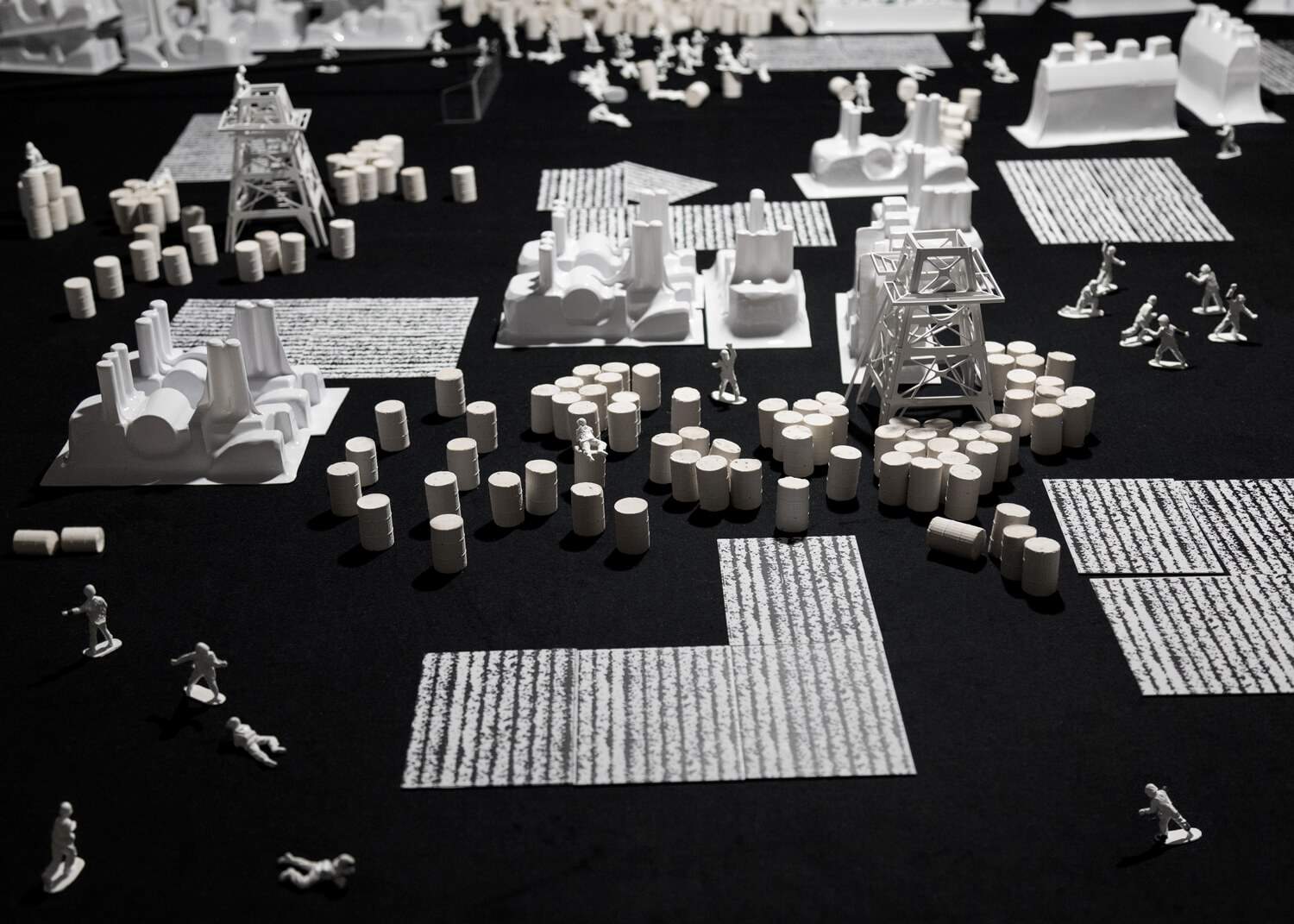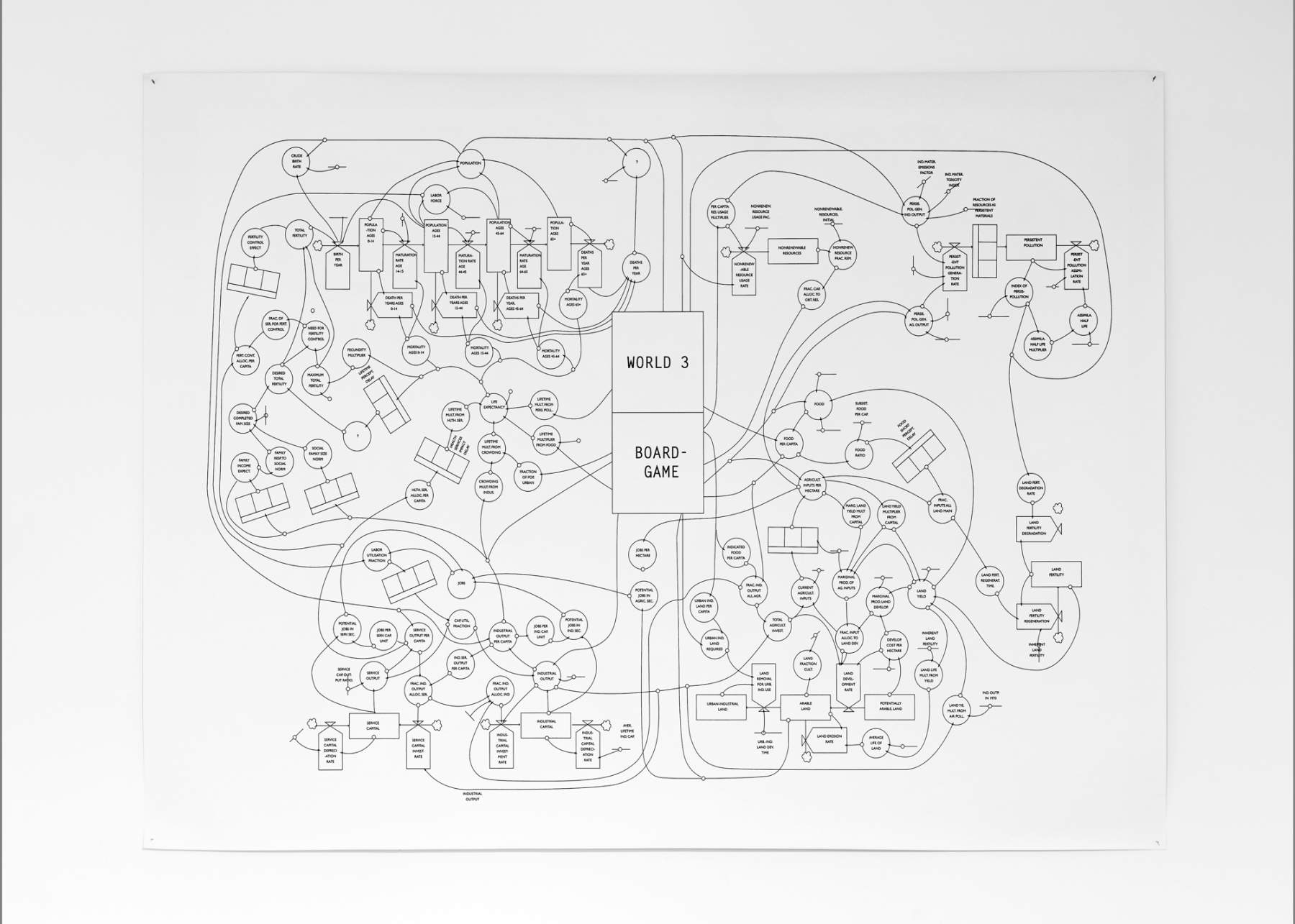World3 Boardgame
05–06.02.2015
If 1968 is frequently associated with the rise of the protest movements of May, the year also marked the founding of a think tank that made a serious and sustained effort to define, from different, critical angle, the imbalances wrought by Consumer Society. Thus began the Club of Rome.
While today it is almost banal to observe that the economic prosperity of societies based on growth is no longer sustainable, it was not so in the early 1970s. Two years after its founding, the Club of Rome commissioned an MIT team of researchers formed by Donella Meadows, Dennis Meadows, Jørgen Randers, and William W. Behrens III to produce a report on the question.1 This group heralded a clear conclusion about perpetual material growth in The Limits to Growth. Jean-Marc Jancovici, writing about the book online, states that the report makes the argument that “sooner or later [growth] will lead to a collapse of the world around us… even if we are very optimistic about future technological capacities.”2
The critical approach adopted by Valentin Defaux proposes putting into perspective the complex system of modeling that laid the ground work for the Meadows report’s conclusions through a computer-assisted board game. In the wake of Guy Debord, who designed in 1977 his version of the Kriegsspiel (war game), reproducing the whole network of strategic and tactical interconnections of war following General Clausewitz’s treatise, Defaux’s own World3 Boardgame brings together all of the factors considered in the Meadows report as pieces that can be handled and moved around, including population size, volume of food production, level of industrialization, pollution control, and consumption of nonrenewable natural resources. In light of the various eventualities they are willing to contemplate, participants decide on a common strategy. With each of their decisions, the computer, steered by the artist, maps out the developments the world will witness over a period of ten years. By way of an example, opting for continued growth leads to the brutal collapse of living standards because of the lack of energy resources, the explosion of pollution, and the shortage of food. On the other hand, if we assume a policy is implemented that preserves natural resources but without gradually reducing the number of births, the shortfall in harvests causes a famine, and so on, to 2100. The outcome of the game depends on a clear-eyed analysis of how the ecological situation the players are put in develops. With Brechtian skill, Defaux makes sure that issues underscored by the Meadows report do not spring from sermonizing or a certain argumentation, but rather from the choices and compromises the players are willing to countenance as the game proceeds.
And while the model established nearly five decades ago by the Meadows report peacefully stays the course like a classic tragedy,3 political leaders claim they are fully alive to the contradiction of our age by making regulatory agreements that are strict and demanding and systematically deferred the very condition of our salvation.4 And yet… if today’s society isn’t able to quickly create the means for achieving sustainable development, it may well bring together, through the rejections and repudiations it will generate in the near future, the forces that are likely to overthrow it. Beginning with the direct victims of fossil capitalism, as is the case right now for the Pacific Climate Warriors of Oceania, the climate refugees of the Southern Hemisphere, and the “energy insecure.”5 And it’s a good bet that if the trend doesn’t turn around before long, the readers of this text will indeed number among the mass of people facing the new reality. Through an educational board game, Valentin Defaux helps us put our finger on a world that is over and done with. By letting us know what it’s about rather than being subjected to it, this game contains the gauge that best suits the situation we are now living through, i.e., being involved.
References
- Donella Meadows, Dennis Meadows, Jørgen Randers, and William W. Behrens III, The Limits to Growth. A Report for The Club of Rome’s Project on the Predicament of Mankind, https://bit.ly/2TVUm50, 1972. ↩
- Jean-Marc Jancovici, “Rapport du Club de Rome – Donella Meadows, Dennis Meadows, Jørgen Randers et William W. Behrens III – 1972,” https://bit.ly/2zN1tWo, November 2009. ↩
- Charles A.S. Hall and John W. Day, Jr., “Revisiting the Limits to Growth After Peak Oil,” https://bit.ly/2Mt7NVX, May-June 2009. ↩
- Jade Ringard, “Un accord historique est signé à la COP21 mais…,” https://bit.ly/3eFSipl, Médiapart, December 2015. ↩
- Christophe Bonneuil, “Tous responsables ?” https://bit.ly/2Apz9JK, Le monde diplomatique, November 2015. ↩





